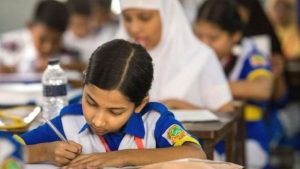Roads Over Roots: Bangladesh Budget Signals Future at the Cost of Education

In the recently unveiled national budget for the fiscal year 2025–26, Bangladesh has once again placed significant emphasis on the transport and communication sector, allocating 23.9% of the development budget to it. This marks the 13th consecutive year that this sector has received the highest allocation in the development component of the national budget .
Transport and Communication: The Continued Priority
The government’s rationale for this continued emphasis lies in the belief that robust infrastructure is pivotal for economic growth. Investments in road, rail, and bridge projects are seen as catalysts for trade, employment, and regional connectivity. For instance, the Road Transport and Highways Division has been allocated Tk 384.96 billion for projects under various departments, including the Roads and Highways Department and the Dhaka Mass Transit Company Limited .

Education: Incremental Increases Amidst Persistent Challenges
While the education sector has seen a nominal increase in allocation, rising to Tk 95,645 crore in the proposed budget, this still represents only 11.88% of the total budget and 1.69% of the GDP . This is significantly below the global recommendation of allocating 4–6% of GDP to education. The allocation is primarily directed towards operational expenses rather than developmental initiatives, potentially compromising the quality of education .
Moreover, the budget utilization in the education sector has been less than optimal. The utilization rate of the development expenditure decreased from 102% in FY2010 to 79% in FY2023, indicating underutilization of allocated funds .

The Case for Prioritizing Education
Education is the cornerstone of sustainable development. Bangladesh has made commendable progress in increasing literacy rates, from 18% in 1971 to 72% in 2020 . However, challenges persist. Only 64% of children complete secondary education, and less than a third of children aged 3–5 are on track to meet literacy and numeracy goals
Furthermore, the quality of education remains a concern. Only 43% of 10-year-old students were proficient in reading before the COVID-19 pandemic, and only 25% of secondary school graduates attained basic competencies . The shortage of qualified and trained teachers exacerbates these issues, with only 74% of teachers in Bangladesh being trained, compared to higher percentages in neighboring countries .
While infrastructure development is vital for economic growth, the persistent underinvestment in education could undermine long-term development goals. A balanced approach that ensures substantial investment in education is essential to equip the population with the skills necessary for a competitive global economy. Prioritizing education will not only address current challenges but also lay the foundation for a more equitable and prosperous Bangladesh.












